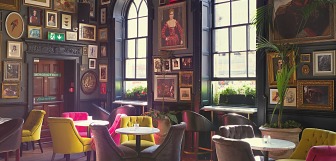What do the New COVID Restrictions Mean for the Hospitality Sector?
Updated: 22/09/20
The news that social gatherings in the UK will now be limited to just six people will undoubtedly come as a blow to a hospitality sector still reeling from the initial lockdown imposed in March of this year.
Indeed, industry analysts are warning that the latest measures will be devastating for the sector, potentially wiping billions of pounds from the economy. The hardest-hit businesses will likely be pubs, restaurants, and hotels - venues which typically benefit enormously from the usual Christmas-time boom in bookings and spending.
New legal obligations for hospitality venues
Although hospitality businesses have always faced operating restrictions since the reopening of July 4th, this time is decidedly different. Police will now have the power to enforce social distancing measures within venues, handing out £1000 fines to individuals who fail to comply with the latest legislation. Businesses are also now required by law gather contact details for the NHS Test & Trace scheme - something that was previously only advisory.
But by far the biggest change is the new rule forcing hospitality venues to close by 10pm. This comes alongside new restrictions which stipulate that pubs, restaurants, and cafes must operate with table service only.
One positive, though, is that hospitality businesses will be able to offer delivery services after 10 pm.
The new measures have raised understandable concerns from businesses in the hospitality sector, which has already incurred huge losses this year. Business owners had been hoping that after the lockdown rules were relaxed in the summer, consumers would begin to return in greater numbers through the autumn and winter.
However, others, including Kate Nicolls of Hospitality UK, are more positive, choosing to view the new measures as an intervention capable of staving off another full-scale lockdown, and the catastrophic damage such an imposition would cause.
What are the new rules for hospitality businesses?
- Groups of more than 6 are now banned from meeting anywhere, both indoors and outdoors
- Venues have a legal obligation to collect customer contact details for Test & Trace
- Venues must close by 10pm
- Pubs, restaurants, and cafes must operate with table service only
What steps can hospitality businesses take to remain compliant?
It is now essential for venues to implement a robust system for gathering and storing customer contact information. Businesses will need to collect the name, telephone number, and date and time of visit from customers at the point of entry. This data will need to be stored for a maximum of 21 days.
Read our guide to safely storing customer information on your Epos Now system.
Perhaps the biggest change for pubs and restaurants is that they will now be legally required to turn away groups of more than six guests. Implementing an online booking system is one way to vet bookings, and ensure that all groups consist of six people or fewer.
In addition to ensuring your restaurant remains compliant, there are additional steps you can take to protect your revenue and margin.
Consider implementing a slimmed-down menu if you're anticipating fewer covers, and make sure you've integrated with an ordering and deliver partner, like Deliveroo, so you can maximise your business' reach. Lastly, it's wise to revisit your floor-plan in light of the changes, ensuring that you allow for at least one metre of distance between tables.
For more information and tips, explore our complete 9 step guide to reopening a hospitality business, where you'll find detail advice and guidance on the steps venues ought to take to remain both compliant and profitable.
Download our complete guide to reopening.



